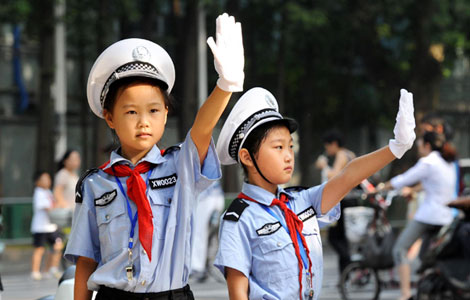Leaders gather for Libya summit
Updated: 2011-09-02 07:16
By Ma Liyao and Zhao Shengnan (China Daily)
|
|||||||||||
PARIS / BEIJING - Delegates from more than 60 countries and world bodies gathered in Paris on Thursday to discuss the reconstruction of Libya.
French President Nicolas Sarkozy and British Prime Minister David Cameron hosted the conference, whose three-hour agenda was expected to focus on re-opening trade ties and setting a date for elections in a post-Gadhafi era.
Vice-Foreign Minister Zhai Jun, invited by France, attended the conference representing the Chinese government as an observer.
Russia, another permanent member of the UN Security Council, that together with China opposed the NATO intervention in Libya, also sent its envoy to the meeting. Russia recognized the National Transitional Council (NTC) as the legitimate authority on Thursday.
While China has yet to formally recognize the NTC, Foreign Ministry spokesman Ma Zhaoxu said on Thursday that the country is ready to maintain close contact with it.
"China respects the choice of the Libyan people," Ma said during a regular news conference.
"China values the important role of the NTC in resolving the Libya issue, and is ready to steadily advance China-Libya relations," he said.
The world's eyes were expected to be on Libya's interim chairman Mustafa Abdel Jalil and interim prime minister Mahmoud Jibril, as the "Friends of Libya" conference gives the NTC its first major platform to address the international community a week after its forces overran Tripoli and drove Gadhafi out.
Jalil was expected to open the afternoon talks with an outline of the NTC's roadmap, which targets a new constitution, elections within 18 months and ways to avoid reprisals. He was scheduled to address an evening news conference along with Sarkozy and Cameron.
Eager to meet immediate civilian needs, the NTC is expected to push for rapid access to billions of dollars in foreign-held Libyan assets frozen under UN sanctions on Libya.
The United States and Britain have won UN permission to unfreeze $1.5 billion each of Libyan assets and France got approval on Thursday to release 1.5 billion euros ($2.16 billion) out of a total 7.6 billion euros of assets in France. The EU also lifted sanctions on Libyan ports on Thursday.
Asked about China's previous dissent to Britain's application to unfreeze Libyan assets within its borders, Ma said China, and other members of the UN Security Council, did so because it considered Britain had to further clarify the usage and monitoring mechanism of the funds in the spirit of being responsible to the Libyan people.
Ma said that the sanctions committee under the Security Council approved the application after Britain submitted additional information.
Ma also said that China supports efforts made to restore stability and push for a smooth transition in Libya. He said the country is ready to play an active role in Libya's reconstruction.
He emphasized that the most important issue at the moment is to restore stability and realize a smooth government transition in Libya.
Some Chinese analysts said the conference was symbolic and was not able to address issues in depth.
He Wenping, an expert on African studies at the Institute of West-Asian and African Studies affiliated to the Chinese Academy of Social Sciences, said that the BRIC countries (Brazil, Russia, India and China) were represented at the meeting because of their economic strength.
"If the Western powers, stricken with economic difficulties, cannot meet the NTC's needs, it can turn to the BRIC countries," he said.
While the Paris talks are not supposed to be about funding pledges, some aid or loans may be promised to aid the NTC, which is using money unfrozen earlier in France to buy wheat.
The European Union, which has sent some 150 million euros in aid to Libya, is preparing measures to help with justice, policing and security, education and financial management.
The EU wants all sanctions removed and the Libyan economy fully operating, Catherine Ashton, the EU's high representative for foreign affairs, told reporters before leaving for Paris.
Apart from Ashton, other heavyweights at the talks included UN Secretary General Ban Ki-moon, NATO Secretary General Anders Fogh Rasmussen, European Council President Herman Van Rompuy and European Commission President Jose Manuel Barroso.
Reuters reported from Paris, Ma Liyao, Zhao Shengnan reported from Beijing, and Fu Jing reported from Brussels.
Hot Topics
Libya conflict, Gaddafi, Oil spill, Palace Museum scandal, Inflation, Japan's new PM, Trapped miners, Mooncake tax, Weekly photos, Hurricane Irene
Editor's Picks

|

|

|

|

|

|







